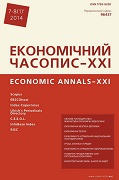КОМПЕТЕНТНОСТНАЯ МОДЕЛЬ НАСТАВНИКА КАК УСЛОВИЕ ЭФФЕКТИВНОГО УПРАВЛЕНИЯ АДАПТАЦИЕЙ ПЕРСОНАЛА
COMPETENCE-BASED MODEL OF THE MENTOR AS CONDITION OF PERSONNEL ADAPTATION EFFECTIVE MANAGEMENT
Author(s): Irina DolgopolovaSubject(s): Economy
Published by: Institute of Society Transformation
Keywords: adaptation; mentoring; surveyor; model of the effective mentor; professional and personal competences
Summary/Abstract: Introduction. Human resources are a major factor of competitiveness of the Russian enterprises of mining and chemical branch. Increasing deficiency of mining engineers constrains increase of economic capacity of the enterprises. In JSC Uralkali, to which more than 20% of the world potash market share falls, decrease in opportunities of attraction for work of surveying engineers in connection with small size of the manpower market in this profession is annually observed. The solution of these experts deficiency problem may be possible due to introduction of mentoring system which will lower indicators of employee turnover and reduce the period of the beginner’s occurrence in independent activity. Management of mentoring instruments adaptation in line with competence-based approach demands selection of mentors according to criteria of productivity. Purpose: development of the mentor professional and personal competences model, which structural elements become criteria of employees’ assessment for selection for a role of effective mentors who will manage adaptation of the beginners. The offered model will allow lowering indicators of the personnel turnover and to increase quality of qualification structure. Methodology & Results. For development a competence-based model of the mentor on a position of surveyor, 3-landmark comparative research of skilled surveyors with various indicators of work efficiency is conducted. Methods of expert assessment, distinctions analysis, correlation and cluster analysis are applied. The criteria model of competences of the mentor is formed taking into account importance of professional characteristics (higher education, length of service in a position of 5 years, the grade/category isn’t lower than an average at the enterprise), as well as motivational and personal characteristics. The last represents a complex of intelligence, discipline, emotional stability and self-sufficiency. Also the structure of the mentor’s necessary competences model includes lack of excessive self-checking and tension, flexibility at work, internal motivation and ability to estimate results. Conclusion. The developed model is recommended to use at selection of mentors for training the beginners on a position «surveyor» from among graduates of educational institutions. Results of research allow considering competence «mentoring » as a condition of the beginners expeditious adaptation to work ensuring.
Journal: Економічний часопис - ХХІ
- Issue Year: 142/2014
- Issue No: 07+08 (1)
- Page Range: 88-91
- Page Count: 4
- Language: Russian

